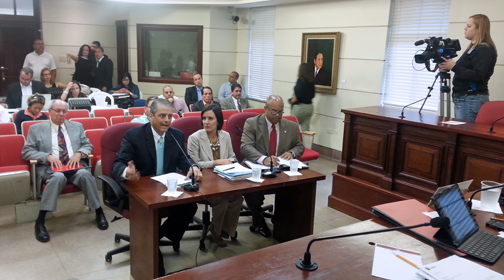McCain blasts Jones Act as ‘contradictory’ to U.S. values


Sen. John McCain (R-Arizona) lashes out against the Jones Act during a panel discussion at Washington’s Heritage Foundation. (Credit: Larry Luxner)
WASHINGTON — Sen. John McCain (R-Arizona) lashed out at the Jones Act during a panel at the Heritage Foundation, saying the 94-year-old maritime law is an anachronism that hurts U.S. farmers and manufacturers at the expense of foreign rivals.
“Laws like this had some rationale in the 1920s, but today they only serve to raise shipping costs. It’s not rocket science,” said McCain, citing a 2002 study by the U.S. International Trade Commission which suggests that abolishing the Jones Act would cut shipping costs by 22 percent while pumping $656 million into the U.S. economy. “I imagine a repeal of the Jones Act today would be closer to $1 billion.”
Under the Jones Act — also known as the Merchant Marine Act of 1920 — all vessels used for domestic shipping must be built in the United States, owned by U.S. citizens and be at least 75 percent crewed by U.S. citizens. Enacted mainly to protect ships moving across the Great Lakes, the law dramatically drives up transport costs between the U.S. mainland and Puerto Rico, as well as from the mainland to Alaska and Hawaii.
Detractors, pointing to a 2012 report from the Federal Reserve Bank of New York, say shipping a 20-foot container of household and commercial goods from the East Coast to San Juan, P.R., on a Jones Act ship costs $3,063 — more than double the $1,504 it costs to send the same goods to the nearby Dominican Republic.
They also point to a March 2013 report by the U.S. Government Accountability Office, which says that, “according to representatives of the Puerto Rico Farm Bureau, the rate difference between Jones Act carriers and foreign carriers has led farmers and ranchers on the island to more often source animal feed and crop fertilizers from foreign sources than from U.S. domestic sources, even though commodity prices were stated to be similar.”
For example, shipping animal feed from New Jersey to Puerto Rico by Jones Act carriers costs more per ton than shipping that same feed from Saint John, New Brunswick, by a foreign carrier — even though that Canadian port is 500 miles further north.
Likewise, according to a Heritage “fact sheet” on the Jones Act, the Puerto Rico Electric Power Authority pays as much as 30 percent more for liquefied natural gas because of restrictions on the use of foreign-flagged ships.

Charles Drevna, president of the American Fuel & Petrochemical Manufacturers, criticizes the Jones Act. (Credit: Larry Luxner)
“The expiration date on the Jones Act is long overdue,” said Charles Drevna, president of the American Fuel & Petrochemical Manufacturers, who joined McCain on the podium. “On the defense side, we sell fighter jets to foreign nations. We buy components of ships and planes from foreign defense contractors. We even use Russian rocket engines. So whatever sense the Jones Act may have made decades ago for national defense purposes no longer applies. Ultimately, the American consumers pay.”
Stumbling block for D.C.
Another panelist, Gary Clyde Hufbauer of the Peterson Institute for International Economics, argued that the Jones Act — along with the U.S. sugar, dairy and peanut industries — hinders Washington’s ability to negotiate trade deals with other countries.
“With global free trade in services, we could increase our exports by about $300 billion,” he told the Heritage audience of about 100 people. “But as long as we have the Jones Act and these other sacred cows in place, it’ll be really hard, if not impossible, to get other countries to liberalize to the extent we would like.”
McCain, who unsuccessfully ran for president in 2008, said U.S. maritime policy also hurts our humanitarian efforts in times overseas food shortages or natural disasters. That’s because of the Cargo Preference Act of 1954, which requires that at least 50 percent of all U.S. government-purchased food commodities be transported on U.S.-owned vessels.
Prior to 2012, that share had been 75 percent, but a Coast Guard reauthorization bill backed by U.S.-flag interests and labor unions and overwhelmingly approved Dec. 3 by a 413-3 vote in the House bumps it back to 75 percent. It now goes to the Senate for approval.

Gary Clyde Hufbauer, a senior fellow at the Peterson Institute for International Economics. (Credit: Larry Luxner)
In a press release, Rep. John Garamendi (D-California) said the bill, among other things, “bolsters enhanced enforcement of U.S. cargo preference requirements that support good-paying jobs for U.S. seafarers. I urge the Senate to pass the bill without delay, so that we can help move our country forward.”
But two U.S. senators, Bob Corker (R-Tennessee) and Chris Coons (D-Delaware) recently told Roll Call they oppose the legislation; so does McCain.
“How do you justify having 30 percent of the value of whatever we’re trying to deliver eaten up because of some arcane, ancient law that restricts how we deliver that humanitarian aid to wherever it’s needed?” McCain demanded. “It’s contradictory to the values of the United States.”
Even so, the conservative lawmaker acknowledge that repeal of the Jones Act “is not going to happen” anytime soon.
“The Heritage Foundation is very well-respected in the circles I travel in, and this is a megaphone we need to use to get the attention of members of Congress and the American people,” he said. “The [maritime] industries of states on the West and East coasts are powerful, but what about the other 40 or so states? Aren’t they interested in seeing less expensive goods and services? Frankly, I’m here because I believe Heritage can have an influence on national policy.”










McCain has been on a mission for 30 or more years to crush the US Merchant Marine. It makes no sense. The only thing I can figure is that his wife was getting serviced my a merchant mariner while he was staying in the Hanoi Hilton